Related Research Articles

Sir John Barbirolli was a British conductor and cellist. He is remembered above all as conductor of the Hallé Orchestra in Manchester, which he helped save from dissolution in 1943 and conducted for the rest of his life. Earlier in his career he was Arturo Toscanini's successor as music director of the New York Philharmonic, serving from 1936 to 1943. He was also chief conductor of the Houston Symphony from 1961 to 1967, and was a guest conductor of many other orchestras, including the BBC Symphony Orchestra, London Symphony Orchestra, the Philharmonia, the Berlin Philharmonic and the Vienna Philharmonic, with all of which he made recordings.
Sea Pictures, Op. 37 is a song cycle by Sir Edward Elgar consisting of five songs written by various poets. It was set for contralto and orchestra, though a distinct version for piano was often performed by Elgar. Many mezzo-sopranos have sung the piece.

Edward Elgar's Cello Concerto in E minor, Op. 85, his last notable work, is a cornerstone of the solo cello repertoire. Elgar composed it in the aftermath of the First World War, when his music had already gone out of fashion with the concert-going public. In contrast with Elgar's earlier Violin Concerto, which is lyrical and passionate, the Cello Concerto is for the most part contemplative and elegiac.
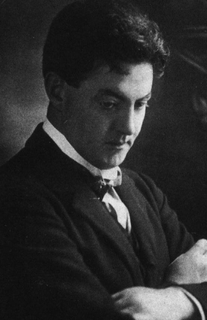
Sir Herbert Hamilton Harty was an Irish composer, conductor, pianist and organist.
The Brodsky Quartet is a British string quartet, formed in Middlesbrough, North Yorkshire, in 1972 as the "Cleveland Quartet". Only Ian Belton and Jacqueline Thomas remain as original members.

In the South (Alassio), Op. 50, is a concert overture composed by Edward Elgar during a family holiday in Italy in the winter of 1903 to 1904. He was working on a symphony, but the local atmosphere inspired him instead to write what some have seen as a tone poem, with an Italian flavour. At about 20 minutes' duration it was the composer's longest sustained orchestral piece to that time.

The Royal Manchester College of Music (RMCM) was a tertiary level conservatoire in Manchester, north-west England. It was founded in 1893 by the German-born conductor Sir Charles Hallé in 1893.

Adolph Davidovich Brodsky was a Russian violinist.
The Quintet in A minor for Piano and String Quartet, Op. 84 is a chamber work by Edward Elgar.

Albert Edward Sammons CBE was an English violinist, composer and later violin teacher. Almost self-taught on the violin, he had a wide repertoire as both chamber musician and soloist, although his reputation rests mainly on his association with British composers, especially Elgar. He made a number of recordings over 40 years, many of which have been re-issued on CD.
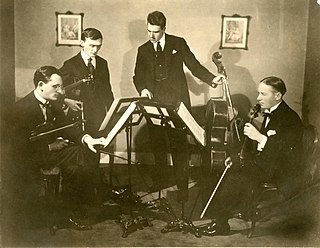
The London String Quartet was a string quartet founded in London in 1908 which remained one of the leading English chamber groups into the 1930s, and made several well-known recordings.
The Stratton String Quartet was a well-known British musical ensemble active during the 1930s and 1940s. They were specially associated with the performance of British music, of which they gave numerous premieres, and were a prominent feature in the wartime calendar of concerts at the National Gallery. After the War the group was re-founded as the Aeolian Quartet.

Arthur Catterall was an English concert violinist, orchestral leader and conductor, one of the best-known English classical violinists of the first half of the twentieth century.
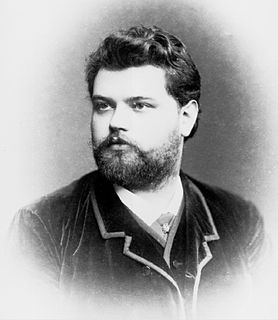
Karel Halíř was a Czech violinist who lived mainly in Germany. "Karel" is also given as Karol, Karl or Carl; "Halíř" is also given as Halir or Haliř.
Watson Douglas Buchanan Forbes was a Scottish violist and classical music arranger. From 1964 to 1974 he was Head of Music for BBC Scotland.
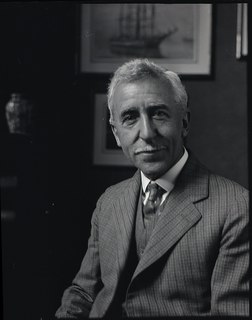
Joseph Leopold Smith was an English composer, writer, music critic, music educator, and cellist who was primarily active in Canada. His compositional output consists of works for cello, piano, choir and orchestra and a considerable amount of chamber music.
The String Quartet in E minor, Op. 83, was one of three major chamber music works composed by Sir Edward Elgar in 1918. The others were the Violin Sonata in E minor, Op. 82, and the Piano Quintet in A minor, Op. 84. Along with the Cello Concerto in E minor, Op. 85 of 1919, these were to be his last major works prior to his death in 1934.
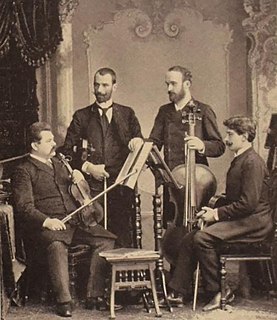
The Brodsky Quartet was a string quartet led by Adolph Brodsky. It was established on 1884, while Brodsky was professor at the Leipzig Conservatoire. The founding members, aside from Brodsky were Ottokar Nováček, Hans Sitt (viola) and Leopold Grützmacher (violoncello).
Sir Edward Elgar wrote his Violin Sonata in E minor, Op. 82, in 1918, at the same time as he wrote his String Quartet in E minor and his Piano Quintet in A minor. These three chamber music works were all written at "Brinkwells", the country house near Fittleworth in West Sussex that Lady Elgar had acquired for her husband to recuperate and compose in, and they mark his major contribution to the chamber music genre. His Cello Concerto in E minor of 1919 completed the quartet of introspective and melancholy works that comprised Elgar's last major creative spurt before his death in 1934.
Raymond Jeremy, FRAM, (1890-1969) was a British violist, known for his quartet playing, particularly the first performances of Edward Elgar's String Quartet and Piano Quintet. He was professor of violin and viola at the Royal Academy of Music in London and taught the violist Watson Forbes.
References
- Baker, Theodore; Remy, Alfred (1919). "Brodsky, Adolf". Baker's Biographical Dictionary of Musicians (3rd revised ed.). New York: G. Schirmer. pp. 119–120. Retrieved 26 September 2010.
- Ehrlich, Alfred Heinrich (1897). "Brodsky, Adolf". Celebrated Violinists, Past and Present. Translated by Robin Humphrey Legge. London: The Strad. pp. 17–19. LCCN 10008593 . Retrieved 26 September 2010.
- Kennedy, Michael (1987). Portrait of Elgar (Third ed.). Oxford University Press. ISBN 0-19-284017-7.
- Moore, Jerrold Northrop (1999). Edward Elgar: A Creative Life. Oxford University Press. ISBN 978-0-19-816366-4.